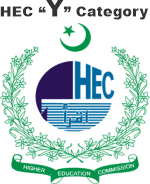IMPACT OF POLITICAL CULTURE ON FOREIGN POLICY OF PAKISTAN: AN ANALYTICAL STUDY
Keywords:
Political Culture, Foreign Policy, Fragmented Political Culture, Decision Making, Pakistan.Abstract
The relation between political culture and policy decision making in a political society is not only significant but also an interesting study to analyze. Policy decision making in a democratic society is a difficult task because in such a society which is overwhelmed by the actual pluralism and social diversification. Pakistan is a novel example of being combination of such socio-cultural value system.
The study will through the light on the major components which effect on foreign policy. In this research, process of decision making, contributory causes, persuasive factors, key components will be discussed. Hence, historical background of Pakistan’s Foreign Policy, its various time spells, alliance with numerous treaties, international organizations, and ties with other states will be heighted. Moreover, inclination of Pakistan towards West bloc or its on Eastern bloc will also be addressed. Quantitative research method will be used in this research. Data will be collected through Secondary Data Collection Method. Descriptive, Historical and Ethnographical method will also use for this research work. Sufficient material will be collected through books, journals, official papers, newspapers, memories and websites etc.
Additionally, this research work will also talk about the political culture of Pakistan, how socio-economic culture makes a political culture. As Pakistan is a country where a beautiful blend of cultures, norms, social and economic values, ethics, beliefs have been found. With this collection and blend of various cultures, central governing body constitutes and present on national level. Objective of this study has to highlight the role of mixed political culture on foreign policy of Pakistan and relate the political culture with decision making.
This study will provide a preliminary base for decision making of Pakistan. As Pakistan consisted on four provinces Punjab, Sindh, Khyber Pakhtunkhwa and Baluchistan. Representatives of these provinces make a central body that draw foreign policy. With the blend of this fragmented political culture an autocrat foreign policy came at national and international level.
Downloads
References
Abdul, S. (2010). Pakistan’s Foreign Policy (1947-2009): A Concise History. Lahore: Oxford University Press.
Almond, G. A. (1974). Comparative politics today, 9/e. Pearson Education India. .
Almond, Gabriel. A. (1974). Comprehensive Politics Today: A World View, Boston; Little Brown & Co.
Amin, Shahid M. (2009). Historical Basis of Pakistan’s Foreign Policy Making Process. In Ahmar, Moonis. (Ed.). Foreign Policy Making Process; A Case Study of Pakistan. University of Karachi: Department of International Relations in Collaboration with Hanns Seidel Foundation, Islamabad.
Branson, M., Schechter, S., & Vontz, T. (2009). Exploring Political Ideas. Washington D.C.: CQ Press.
Farooq, U. Diminishing Returns: Sufi Shrines in Pakistan’s Politics. Retrieved from: http://therevealer.org/archives/18908.
Heywood, A. (1997). Politics. London: Macmillan Press Ltd.
Husain, J. (2004). The process of foreign policy formulation in Pakistan. Islamabad: Pakistan Institute of Legislative Development and Transparency
Karim, A. S. (1994). Political Culture of Pakistan, A National Policy-Decision Process: South Asia Democracy and the Road Ahead. Katmando Nepal: University Press.
Karim, J. (2004). Polarization of political culture: Islam and Pakistan, 1958-1988.
Khalid, D. I. (2013). Pakistan Foreign Policy; Evolution, Development and Strategies. Lahore: Peace Publishers.
Mazhar, M. S., & Goraya, N. S. (2013). Foreign Policy of Pakistan: Internal Challenges. J. Pol. Stud., 20, 91.
Paracha, N. F. (2013, 02 May). Political Parties in Pakistan: Roots, Fruit & Juice, DAWN.
Raheem, A. Overview of Ethnicity in Pakistan. Retrieved from http://ethnicityinpakistan.blogspot.com/2012/10/EthnicityInPakistan.html.
Rizwan, A. (2009). An Introduction to Foreign Policy: Definition, Nature & Determinants. https://amerrizwan.blogspot.com/
Schechter, S. L., Vontz, T. S., & Branson, M. S. (2010). Exploring Political Ideas. United State of America: CQ Press.
Voinea, C. F. (2017, May). Polity Modelling. Political culture based modelling of the Eastern European polities.

Downloads
Published
Issue
Section
License
Copyright (c) 2024 PAKISTAN ISLAMICUS (An International Journal of Islamic & Social Sciences)

This work is licensed under a Creative Commons Attribution 4.0 International License.
This work is licensed under a Creative Commons Attribution 4.0 International License.
































